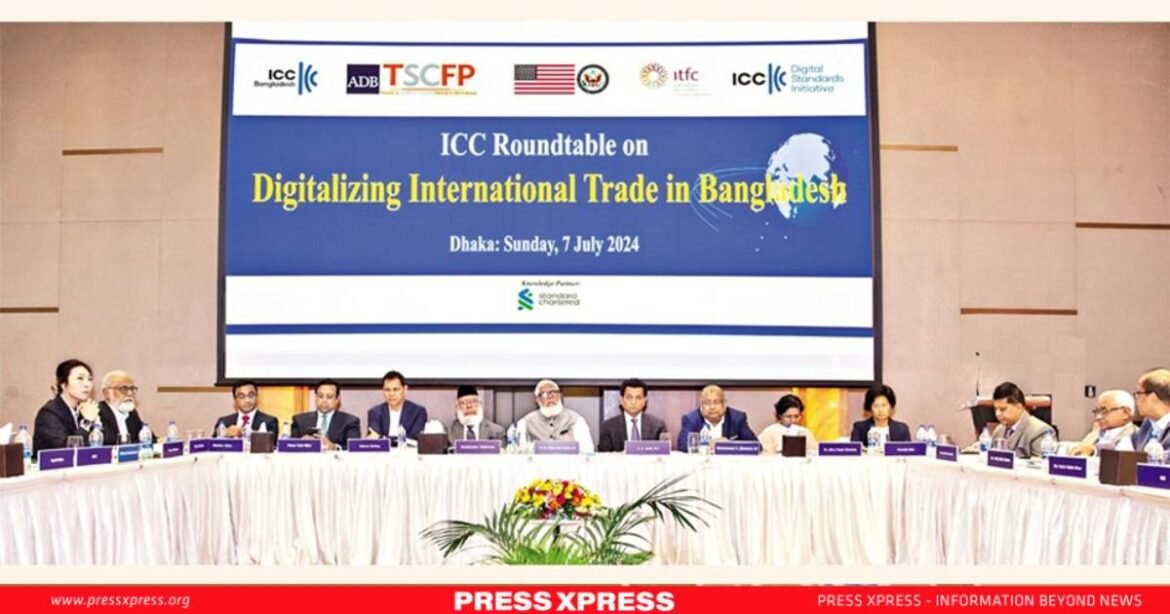Bangladesh is set to revolutionize its trade practices by shifting to a fully digital platform, marking a new era in international commerce. This groundbreaking transformation, which includes comprehensive overhauls in logistics, legal frameworks, technology, and knowledge-based support, heralds a new era for the country’s trade transactions.
You can also read: Postal Service ‘EMTS’ Revolutionizes Money Transfer Convenience!
As global trade dynamics rapidly evolve, Bangladesh’s shift from traditional methods to digital processes marks a significant leap forward in its economic strategy, especially in the realm of international commerce. This urgent transition is not just about keeping pace with global trends; it’s a strategic imperative for securing the nation’s economic future.

The potential benefits of this digital transformation are substantial. Digital trade processes could reduce Bangladesh’s trade costs by 11-12 percent and potentially increase exports by an additional $0.6 billion annually. This projection highlights the significant economic advantages that await Bangladesh as it modernizes its trade infrastructure.

Forms of digital trade operations
In 2020, global services exports saw a significant 20% decline compared to 2019. However, exports of digitally deliverable services, which can be remotely delivered via ICT networks like the Internet, showed resilience with only a 1.8% decrease despite the pandemic’s economic disruptions (UNCTAD, 2021a). This sector accounted for over 64% of total services exports globally (Figure 1), highlighting its growing importance. From 2005 to 2019, digitally deliverable services experienced robust growth, averaging 12% annually, with Asia seeing rates as high as 21%. This trend underscores the increasing significance of these services in global commerce.

How digital trade transactions work for ICC regulatory frameworks
The ICC Uniform Rules for Digital Trade Transactions (URDTT) [Diagram: 1] were developed with several key objectives in mind: (a) to accommodate a fully digital environment, (b) to remain neutral regarding technology and messaging standards, and (c) to encompass the corporate sector, including commercial transactions and the growing network of non-bank financial service providers. The URDTT is designed to align seamlessly with the United Nations Commission on International Trade Law (UNCITRAL) Model Laws, which cover various aspects of electronic commerce, electronic signatures, and electronic transferable records.
Challenges and Future Impact
Despite the clear benefits, about 40 percent of containerized trade still relies on physical paperwork, particularly bills of lading. This reliance not only slows down transactions but also increases the risk of fraud and environmental damage. The adoption of electronic bills of lading alone could unlock $30-40 billion in global trade by reducing friction, according to a McKinsey study cited by ICC Bangladesh President Mahbubur Rahman. For Bangladesh, this translates to significant export growth and enhanced market access. Beyond transaction efficiency, digital trade has the potential to create jobs, expand access to global networks, and position Bangladesh competitively in international commerce.
As noted by Pamela Mar, managing director of the DSI at the International Chamber of Commerce, this transition is crucial as Bangladesh graduates from its Least Developed Country status and aims to become a middle-income nation by 2026. The digitalization of trade is expected to build upon Bangladesh’s existing strengths in export manufacturing while preparing it for future challenges. It promises to enhance efficiency across the entire supply chain, from exporters to logistics providers, customs officials, and financial institutions.

The Electronic Trade Documents Act 2023
The Electronic Trade Documents Act of 2023, which came into force in July 2023, implements the recommendations made by the UK Law Commission in March 2022. This act grants specific digital trade documents the same legal status as their physical counterparts.
The Electronic Trade Documents Act (ETDA) [diagram-2] applies to trade documents that traditionally required physical possession to hold legal validity and serve their purpose. Previously, the concept of possession was restricted to tangible items that could be physically handled. Under the new legal framework in the United Kingdom, it is now possible for individuals to possess electronic documents.
Government Commitment to Digital Transformation
Ms. Waseqa Ayesha Khan emphasized that digitalization in every field, including international trade, is crucial for Bangladesh’s development. Building on the country’s success in establishing a ‘digital Bangladesh’, the government now aims to build a ‘smart and developed Bangladesh’ by 2041. This vision includes becoming a developed nation and effectively addressing the opportunities and challenges presented by LDC graduation.
Conclusion
With support from international organizations and a clear government vision, Bangladesh is well-positioned to leverage this digital trade revolution. By reducing operational costs and enhancing trade efficiency, the country is poised to propel its economy towards new heights in the coming years, solidifying its position in the global digital economy.


